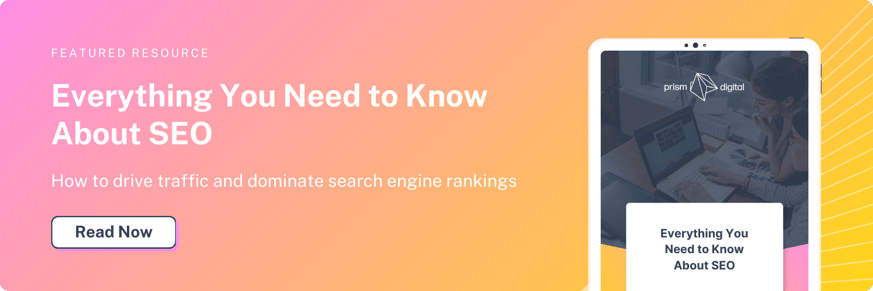What the heck is SEO?
Are you at the start of your SEO journey? Perhaps you’ve heard the hype and are looking to drive traffic to your website by getting higher rankings. It’s perfectly normal to feel a bit overwhelmed by how it all works and what areas to focus on. But don’t stress—you’ve come to the right place. Read on to find out what every business needs to know about SEO.
Defining Search Engine Optimization (SEO)
Let’s start by addressing the most obvious question: what the heck is SEO? Well, SEO stands for ‘Search Engine Optimization’, which is a set of processes aimed at improving your website’s visibility in search engines (such as Google). SEO can better your website’s position in search results pages. After all, the higher the website is listed, the more people that will see it.
Good SEO involves many different activities, such as:
- Identifying relevant keywords with good search traffic potential
- Creating high-quality, useful content and optimizing it for search engines and for users
- Technical optimization
- Including relevant links from high-quality sites
- Measuring the results
Why is SEO important?
Search engines are usually one of the biggest traffic sources to websites. Every day, Google users conduct billions of searches for information and products. In order to harness this traffic source’s potential, you need to appear in the top search results for your target keywords—appear as the number 1 organic result and you’ll be 10x more likely to receive a click than a page ranking in position number 10.
Search engine optimization will:
1. Play a key role in improving your ranking positions2. Drive more traffic to your website, bringing you new customers and more brand awareness
Differences between paid and organic search
From the outset, it’s important that you understand the differences between the organic, natural search synonymous with SEO and paid search.
Paid results—You have to pay to be here, through pay-per-click (PPC) advertising.
Organic results—You must “earn” your rankings here, through SEO.
There are 5 key differences:
|
Paid results |
Organic results |
|
|
Position |
Paid results appear at the top of search engine results pages. |
Organic results appear beneath paid results. |
|
Time |
You get near instant results, sometimes in minutes. |
Results take more time—often weeks, months, and even years. So you have to play the medium to long-term game with organic search. |
|
Payment |
You pay-per-click (PPC) on a cost-per-click (CPC) basis—what that means is, you pay a fee every time a user clicks on your ad. So instead of relying on organic traffic to your website, you buy traffic for your page by paying Google to show your ad when your visitor does a search for your keyword. |
Traffic is free, although it does require an investment of both resources and time. |
|
Return on investment (ROI) |
ROI is much easier to measure with paid search. That's partly because Google provides more keyword data that you can capture in Google Analytics. However, ROI can stagnate or decline over time. |
ROI is a little bit harder to measure, but it often improves over time. Over the long term, organic search can offer a very good return on investment. |
|
Share of traffic |
When it comes to the share of traffic, roughly 20% to 30% of searchers click on paid results. |
70% to 80% of searchers click on SEO results. So the lion’s share of clicks are actually on the organic results. |
The 4 types of SEO you need to boost your site traffic
If you want to get as much traffic to your site as you can, you're going to need more than just one kind of optimization. You probably won't need to use all of these, but having a better understanding of how to improve your rank is always a good thing.
1. On-page SEO
Effective on-page SEO is built on high-quality, informative content. If you're writing a detailed piece on a topic, you're going to include a lot of relevant and related keywords. And making sure that those keywords are totally optimized to meet your goals can provide a big boost to your SEO.
Having a site that's easy for visitors to navigate is important, too—if your visitors want additional information, but it's hard to figure out where it is, they're not likely to stick around to figure it out. Using the topic cluster model is an excellent way to group relevant content together so that it is easier to find (for users and search engines).
2. Off-page SEO
The most important part of off-page optimization is link-building. Getting links to your site helps bring in visitors, and it shows Google that your site is authoritative. Other tactics include:
- Social media—If people are talking about your content on Facebook, Twitter, LinkedIn, or other social networks, search engines take that to mean that it's worth talking about and help other people find it. Having a piece of content that's popular on social media gets you a lot of traffic, too, which can help your SEO as well.
- Solid promotion—Promoting your content to the channels where your audience spends time requires a lot of time and effort. The payoffs, however, can be huge.
- Building positive relationships—Get friendly with bloggers, journalists, social media personalities, and the people behind websites similar to yours. Commenting on other blogs can be helpful, as well as asking guest bloggers to write content for you.
3. Technical SEO
Technical SEO is related to on-page factors but has to do with things that go on behind the scenes. You can improve your technical SEO by:
- Using responsive design that scales well to mobile devices
- Improving page speed—if your page loads slowly, you're going to lose visitors, and you might be penalized by ranking algorithms
- Optimizing images
- Using a secure HTTPS connection
- Uploading detailed sitemaps
- Optimizing the HTML on each page
- Making sure your robots.txt file is updated to help crawlers find the right information faster
4. Local SEO
While many businesses only operate online, there are still thousands of companies that have a physical location where they need customers. If customers aren't coming through your door, you're not making money. So it's important to do the following when doing your SEO:
- Make sure that you've claimed your Google My Business page, which ensures that your name, address, phone number, opening hours, reviews, and other useful information is prominently displayed in search results and on Google Maps. That listing itself needs to be optimized with good photos, descriptive information, and real reviews from customers.
- Be certain that your contact information is prominently displayed and highlighted with schema markup so search engines know where it is. The more effectively you present this information to search engines, the easier it will be for them to show that information to potential customers.
- Take the time to embed a Google Maps marker in your homepage. Adding a region or city to your page titles, descriptions, and keywords, and displaying awards and trust symbols can also make a big difference not only in being found by local leads but also in turning those leads into customers.
What is the role of SEO in digital marketing?
The prime objective of SEO is improving the visibility of a website in search engines. As such, an seo strategy is instrumental to the success of any marketing plan.
Partner with Prism Digital, and our search engine optimization experts will design relevant website content that encompasses topics and subtopics, which overtime, evolves into a valuable traffic source.
Schedule a call with us today.
.png?width=200&height=73&name=Logo(1).png)


